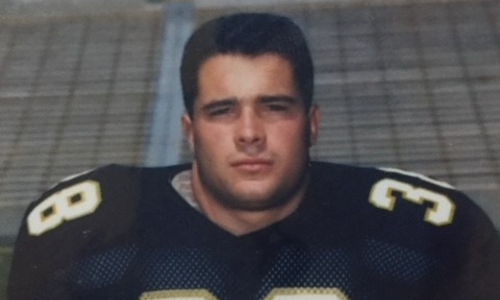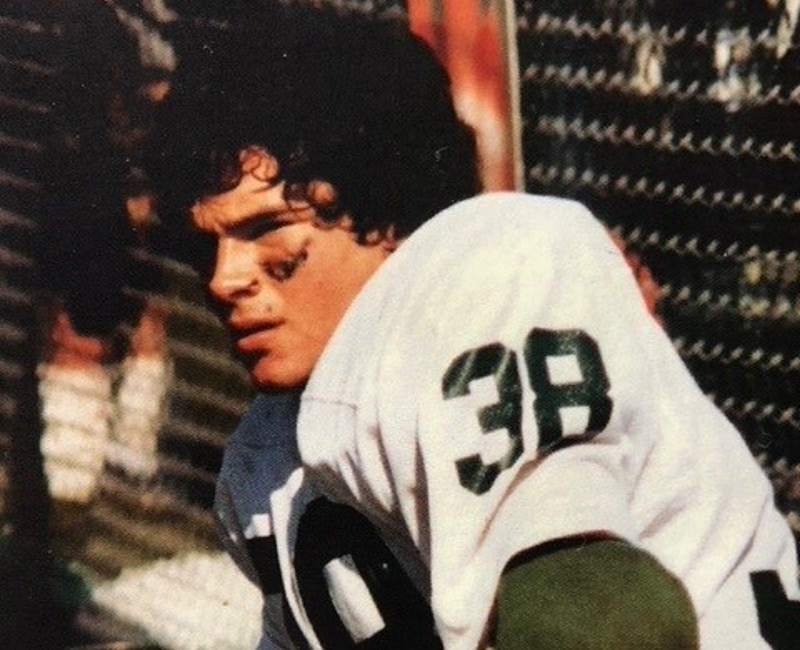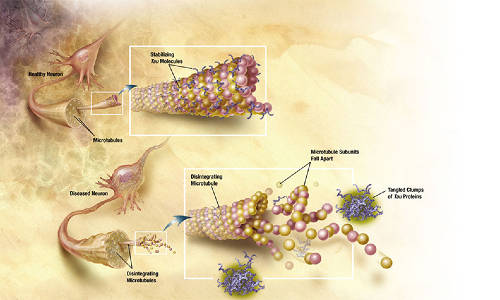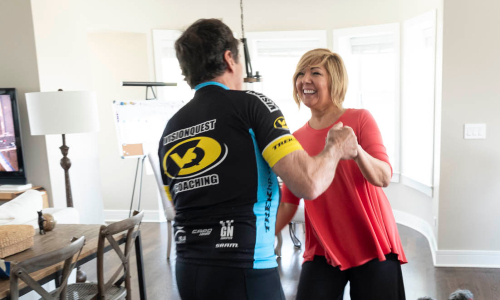Legacy Stories
Eugene Merlino
Gene Merlino loved his family and he loved football. He took up the sport in his youth, eventually becoming a fullback for the Army football team at the U.S. Military Academy. Concussions forced him off the field and by his 40s, his personality had drastically shifted. He became withdrawn, unpredictable, and aggressive. Merlino passed away on July 9, 2021, at the age of 55. His brain was donated to the UNITE Brain Bank, where researchers diagnosed him with stage 2 (of 4) CTE. Below, Gene’s wife Kelly shares his Legacy Story to show their challenges and raise awareness around the disease.

By Nicholas Paik
Gene and Kelly Merlino first met in New York City. Gene was charming, generous, good-looking, ambitious, and humorous, all of which initially attracted Kelly to him. The rest, as they say, was history.
As they grew closer, Kelly learned more about Gene’s beginnings: he was full of life and loved all kinds of sports and being active. On land, he could be found playing football, wrestling, skiing, or riding his dirt bikes and motorcycles. In the water, he enjoyed boating, scuba diving, and water skiing. But his first love was always football. He loved the comradery, being part of a team, and the values it instilled in him. He played the sport starting in third grade, throughout high school, and earned a spot on the Army football team at the U.S. Military Academy at West Point.

The Merlinos dated for a few years before getting married in 1998. They settled down in Mendham, NJ and had three sons: Max, Louis, and Ryder. To Gene, nothing was more important than family. Kelly and the boys were his entire world. They spent the summers up at their lake house in the Adirondacks. They always loved having a house full of family and friends. Gene loved entertaining on their boat and teaching kids to water ski and go tubing. Though everything seemed wonderful in the beginning, Kelly sometimes saw flashes of a different Gene.
Gene had been only a few years removed from football by the time the couple met but was already feeling the aftereffects of the numerous concussions he suffered while on the field.
First were the constant migraines. There was frequent times Gene could barely tolerate any light or sound, so at times he had to stay by himself in a basement, in complete darkness, to find relief. Then there were the nosebleeds; Kelly remembers certain moments when he was profusely just gushing blood everywhere.
Still, on the good days, Gene was an amazing husband, father, and friend. He took great pride in providing a stable life for his wife and kids. He coached Max’s football team and made it a priority to attend his children’s games. He loved being a mentor for the players he coached and teaching them about the philosophy of a team sport, which he fully believed could be applied to many aspects of daily life. But eventually, the number of good days started to disappear. Gene experienced periods of brain fog where he could not think straight, organize his thoughts, or recall memories, even if they had occurred recently.
Kelly kept a journal to help herself cope with the changes in Gene. The journals in turn helped to track Gene’s symptoms and the changes in his personality. She didn’t realize until reflecting on the entries how severe the personality and behavioral changes were and how quickly they were happening. Looking back on her entries now, she says her days mostly revolved around trying to help her husband and keep her family safe while her life became entirely consumed by chaos.
“It was terrifying and difficult to process for the entire family,” said Kelly. “We struggled with the question, ‘How does someone you love change before your eyes with no explanation?’”
As Gene entered his 40s, his personality shifted drastically. Each new day brought a waiting game to see how he would act. The majority of the time, Gene’s mood dominated the energy in the home which inevitably trickled down to Kelly and the children. He was unpredictable and could be fine one moment, but moody or frightening the next. Impulsiveness and rage were part of the new normal. The once social Gene became withdrawn, self-destructive, paranoid, overly negative, and not present. He struggled to follow conversations and would get easily frustrated. Work became more and more difficult due to the deteriorating of his executive functioning skills. He struggled with organizing, following directions, and would lose large gaps of time. Sleep became elusive and he’d stay up all night with his mind racing. He could snap at anyone on a whim, from family to strangers.
“Towards the end of his life it was like he was a shell of the man he used to be,” said Kelly. “He would constantly tell us that he was a burden to us all and we would be better off without him.”
In 2013, Gene was featured on a GQ docuseries called Casualties of the Gridiron, which looked at the impact of concussions on football players. Cameras documented his difficulties, Kelly’s experience as a caregiver, and their journey finding help and answers for Gene.
“I have this, I call it sponge head or fog head. It just doesn’t go away,” described Gene of his struggles in one clip. “I wake up every morning and I open my eyes and there it is again. It starts to become so overwhelming.”
Gene continued to battle symptoms in his early-mid 40s before passing away on July 9, 2021 at the age of 55.
---
Back in 2012, Gene had gone by himself to Boston without telling anyone, wanting to donate his brain to research. He knew he had all the symptoms of CTE and suspected he might have the disease. When Gene returned home, he gave Kelly the official paperwork and let her know he wanted to donate his brain when he passed. After his passing, she fulfilled his wish and his brain was studied at the UNITE Brain Bank, where researchers diagnosed Gene with stage 2 (of 4) CTE.
Upon hearing the results, Kelly, her sons, and family felt relief knowing their suspicions were confirmed. They now had an explanation for why he morphed into a completely different person.
Kelly is sharing her husband’s story to help raise awareness around CTE. For too long, Kelly and her sons felt as if they needed to keep Gene’s behavioral changes a secret which needed to be kept to protect Gene. There was very little help for Gene, for her, or their children. She wants other families to know they are not alone. There are resources available, such as the CLF HelpLine, which can provide personalized support and guidance to anyone struggling from a brain injury.
Her biggest piece of advice to other families and caregivers?
“When they tell you what they’re feeling and experiencing, please believe them, and support them as best as you are able to,” said Kelly.
You May Also Like

Learn about symptoms, risk factors, and what causes the neurodegenerative disease Chronic Traumatic Encephalopathy (CTE).
What is CTE?
Living with suspected CTE can be difficult, but CTE is not a death sentence and it is important to maintain hope. Find out how.
Living with CTE